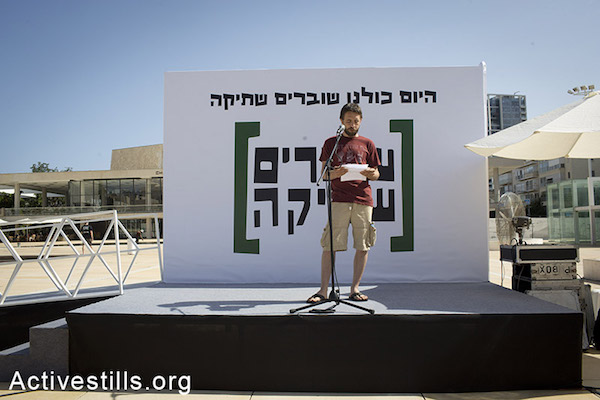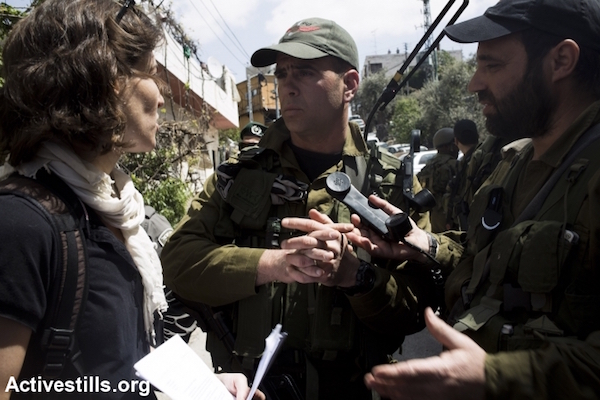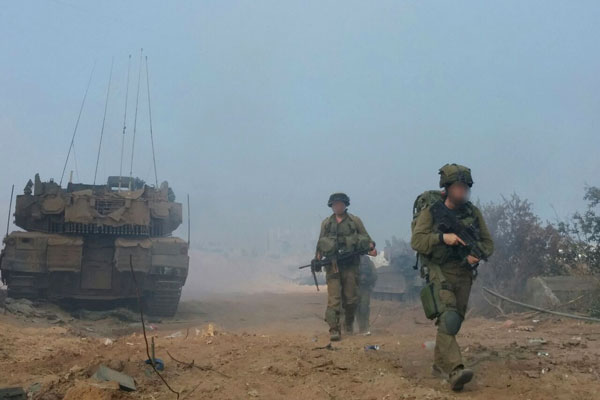The organization of former Israeli soldiers is coming under attack from every direction these days — from the Israel’s president to the defense minister to the police. So what’s the deal?

Breaking the Silence is a Jewish organization made up of former Israeli soldiers, most of whom served in combat roles. All they want to do is to tell Israeli society, which sent them to the occupied Palestinian territories, what they did there as soldiers. They do so through written and video testimonies collected form over 1,000 soldiers, all of which were approved by the IDF Censor before being published. That’s all.
They don’t support the Palestinian boycott, divestment and sanctions (BDS) campaign. They aren’t trying to have Israeli officers tried for war crimes (on the contrary: they believe that the political echelon, not the army, should be held responsible for the occupation). They do not justify any Palestinian violence. They don’t even call on Israelis to refuse to serve in the army, and many of them still do reserve duty every year. If anything, one could pretty easily criticize Breaking the Silence from the left side of the political map.
And yet, since Breaking the Silence was established it has been under constant attack from the Right in Israel — an attack that has grown louder over the past few months. In the latest chapter of the absurd campaign against the organization, Defense Minister Moshe Ya’alon banned Breaking the Silence from any and all IDF activities. Why? Because if the organization “really shared our values … they would work directly with the IDF, and wouldn’t tarnish our soldiers overseas.” Got that? Because they don’t speak to the army they are no longer allowed to speak to the army. Brilliant.

But let’s take a look at the accusations against Breaking the Silence one by one:
The first claim, which in my mind is the most important and critical accusation to refute, is that Breaking the Silence is not credible. The organization’s critics come up with all sorts of reasons why the organization isn’t credible, but there is one rebuttal that is awfully difficult to refute: In the 11 years that Breaking the Silence has collected and published testimonies, there has not been one instance in which a serious error — not to mention a fabrication — has been found in their published testimonies.
This is no insignificant point — it needs to be the heart of the debate. An organization that publishes hundreds of testimonies, which works with more than 1,000 soldiers, which has dealt with very complicated subject matter for 11 years — and not a single fabricated published testimony has ever been found. No court of law in any land can boast of such a record. And that is despite a number of attempts to fool the organization by giving them false testimonies. Their researchers and fact-checkers seem to have a perfect record of catching fabrications before publication.
That astounding success is the result of the massive investment Breaking the Silence makes in every single testimony. As the organization’s director of research has written here in the past, every testimony given by a soldier or former soldier is fact-checked, and the background of the incident or testimony is verified along with the identity of the testifier him or herself (and that they are not an aspiring politician looking to make a name for himself). The entire testimony is then corroborated with any available information — both from other soldiers’ testimonies and open source information. Some of the most hair-raising testimonies collected by Breaking the Silence were never published because the organization could not independently corroborate them. Just imagine if journalists who published attack pieces on the organization applied their strict verification standards to their own work and the malicious things that are said about it.

The second claim is that they don’t hand over their testimonies for investigation by the army. I say: why hand them over? First of all, in its early years the organization did hand over its testimonies to the army. And what happened? They were paid a visit by the military police, which sought to investigate the very crimes they were testifying about, as if they were the guilty party and not their commanders or the army’s policies in the territories. So why hand over testimonies if all it means is that you will be investigated for testifying?
Add to that the fact that others who decided to air such criticisms from within the army did not have any greater success (like the story of the refuseniks from Israel’s hi-tech intelligence Unit 8200, who first complained directly to their commanders). And the fact that Israel Military Police investigations (which aren’t always even initiated in the first place) only rarely lead to indictments and convictions, as has been documented time and again in our special investigative series “License to Kill.”
But even if all that weren’t the case, there would still be no need for Breaking the Silence to hand over its testimonies for the army to investigate. The whole point of Breaking the Silence is that the military occupation in the territories is itself the problem, and that injustices are an inherent part of that situation, not exceptional incidents or the result of “bad apples.” So what exactly is the army supposed to investigate? Whether it has been ruling millions of people under a military regime for almost 50 years? Whether that military regime is responsible for inescapable systematic violations of human and civil rights? (By the way, when the army wants to, it knows how to use Breaking the Silence testimonies in order to advance its investigations.)
The third grievance is that the organization’s testimonies are published anonymously. First of all, there are plenty of testimonies that are not anonymous, with names and faces and all that jazz. And regarding the anonymous ones: in a society that is so quick to pounce on anybody who levies the slightest criticism against the army, in an army that is quick to investigate anybody who gives their own testimony, and the weight of the guilt many of them surely feel for their deeds, where most of those testifying probably don’t want their friends and family to know what they’ve done — you can begin to understand why.
The fourth claim is that Breaking the Silence is funded by foreign countries. Yeah? So what? Seriously. If we’ve already established that testimonies the organization publishes are verified as true, then what does it matter whether a foreign country helps fund their publication? Because those countries have their own agendas? So what? Every country has an agenda and interests. Every organization, every institution and every individual person has an agenda. What’s wrong with having an agenda? It’s the testimonies themselves that deserve to be debated, not who paid the book binder and the graphic designer who created the cover art.
The fifth — and central — claim against Breaking the Silence, is that they also operate overseas. A large part of this accusation is just absurd, mostly because it is most often flung at the organization when it holds events in Israel — like when they give lectures to Israeli soldiers.
So no, they’re not just an outward-facing organization. Most of Breaking the Silence’s activities are held in Israel. The soldiers served in the Israeli army, it is here that they are interviewed by the media, it is here that they organize tours of the occupied territories every month, it is here that they give lectures (which are sometimes shut down by authorities), and it is here that they read testimonies in the streets. And yes, they travel overseas now and again, partly because they feel — and rightfully so — that nobody’s really listening to them here. And that’s legitimate.
So why does the Israeli Right have such a hard time dealing with Breaking the Silence? For all of the reasons laid out here. Because they are soldiers. Because they are speaking the truth, and go to great lengths to ensure that their testimonies are accurate. Because they take great pains to explain that this is a systemic problem and not just a few bad apples. Because they invest massive amounts of time and money in reaching out to Israeli society in order to show it just how ugly military occupation is.
For all of those reasons, because the Right doesn’t have an answer to them, the right wing in Israel blows smoke and slings mud at them. All in order to stop people from hearing what they have to say. Except it’s important to hear what they have to say. Take a tour with Breaking the Silence. It’s worth your while.
This article first appeared in Hebrew on Local Call. Read it here.


